About Ben Yarmolinsky
I was born in 1955 in Washington, D.C. to an assimilated Jewish family with literary and political interests. Growing up in the woods of northern Virginia, and later in the academic groves of Cambridge, Massachusetts, I was a bookish child, but also enjoyed other activities such as baseball, swimming and getting high.
I was, from an early age, an ardent music lover. At the age of eleven I started to play the guitar. My strongest early affinities were with the music of (in alphabetic order): Bach, the Beatles, Beethoven, the blues, Miles Davis, John Dowland, Bob Dylan, flamenco, folksong, Gershwin, Tom Lehrer, Motown, Ravel, the Rolling Stones, Satie, Sor and Stravinsky.
At fifteen, I moved with my family to New York where I attended Saint Ann’s School in Brooklyn. There I began lessons in classical guitar, piano and theory, and wrote my first notated compositions. In 1972, I entered Harvard where I majored in music. After my sophomore year, I spent two years in Paris where I studied guitar at the Ecole Normale de Musique, and took private lessons with Nadia Boulanger. When we met, she was eighty-six and I was nineteen. Despite the difference in age, we got along well. I learned the fundamentals of harmony from her, as well as an appreciation for the music of the European tradition.
After finishing my degree in 1977, I took a job teaching music at the American School of Tangier and remained in Morocco for the next four years, teaching, composing, performing and spending time with the expatriate American writer Paul Bowles. He became a mentor to me and encouraged my composing and my interest in Moroccan music. This latter interest would lead to my Ph.D. dissertation, The Music of the Jilala: A Repertoire of Spirits.
Returning to New York, I enrolled in the graduate program in music at City College where I studied composition with David Del Tredici, Lester Trimble and Ned Rorem. I then went on to the Graduate Center of the City University of New York where I received a doctorate in music composition in 1991.
In the eighties and nineties, I discovered that my musical, political and literary interests could be combined in various ways. Some projects I worked on were: The Constitution: a secular oratorio, a setting of large portions of the U.S. Constitution, April 15th Blues, a musical theater piece about taxes, Clarence & Anita, a documentary opera based on the Clarence Thomas confirmation hearings, and a series of song cycles on American poets. This variety of subject matter suits me and I continue to explore both familiar and unconventional musical territory.
I am a founding member of Friends and Enemies of New Music, an organization that presented concerts of contemporary classical music in New York from 1989 through the aughts. In 1998, I was appointed professor of music at the Bronx Community College of the City University of New York. Since then, I have continued to perform from time to time as a solo guitarist, accompanist, and singer of my own songs. Since the nineties, I have worked as a lyricist as well as a composer, and have written many songs and several musical theater works in that capacity.
The Friends & Enemies of New Music, ca. 1990.
Little by little I have composed a large body of work, including operas, musical theater works, chamber music and many songs. I am neither a revolutionary nor a reactionary. My style is a personal homage to music I have known and loved—from nursery rhymes to North African rhythms, from blues songs to Renaissance lute songs and Baroque dances—it is a logical development of my early musical affinities. If my music tends to be, in the words of the New York Times' Alan Kozinn, "wildly eclectic," it is so because of my belief that one should write what one hears, wherever that may lead.


